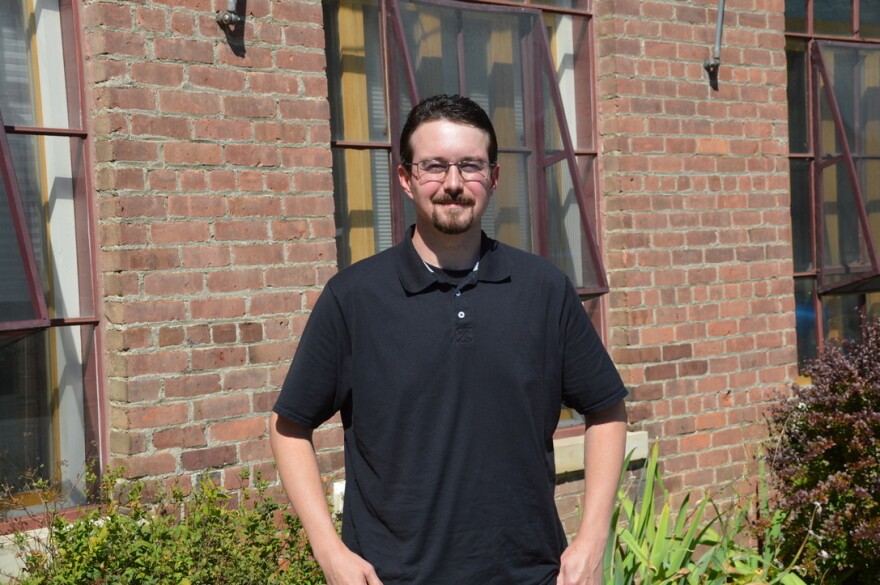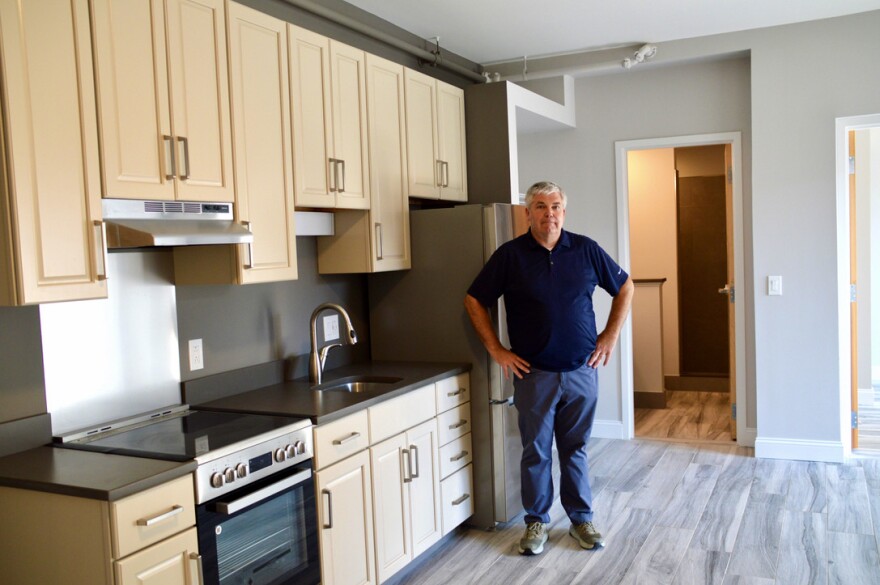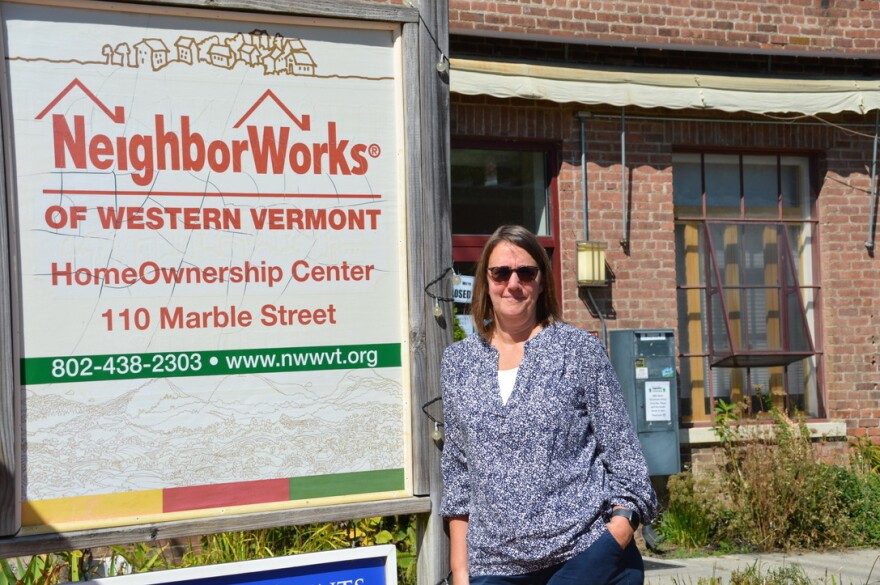When we asked Vermonters across the state what they want politicians focused on in the next election, housing has been near the top of the list.
It’s a huge problem affecting older Vermonters who want to downsize, Vermonters with no housing at all, and a large number of working Vermonters — like Jenel Ronn and Caty Manning — who feel like homeownership has become an impossible dream.
The Rutland couple want so badly to buy their first home. But after two years, they’re still looking.
“Like, I didn’t think that in Rutland, Vermont, to have a modest three-bedroom, two-bathroom house was going to be a half-million dollars,” said Ronn.
“I mean we found one ... two-bedroom, one-a-half-bathroom ranch. And it had massive mold in the basement,” she went on. “And still we were like 'We’ll fix it! It's in our budget! We'll live with it ... you know, it's fine!'" they laughed in mock exasperation.
But even on that moldy fixer-upper, they got outbid.

Ronn says having just turned 40, the situation feels crushing.
“I went to a good college,” she explained ticking off an imaginary list with her fingers. “I got good grades. I played by the rules. I paid my bills, I have a really good credit score, I’m gainfully employed. I’m a director of a team of seven people,” she said, shaking her head. “And I can’t afford a modest two-bedroom, two-bathroom house.”
More from Vermont Public: Rutland voters share what's on their minds as they get ready to vote
This is not just a Rutland problem. You can hear stories like this all over Vermont. All over the country.
And — it’s complicated
"When we look at what’s needed in the community for housing,” explained Rutland Mayor Michael Doenges, “there's something I like to describe as the housing log jam.”

Rutland has plenty of single family homes. The problem, according to Doenges, is older Vermonters are hanging on to them even though their kids are grown and gone. Many are paid for and those with mortgages don’t want to give up the low interest rates they locked in years ago.
And even if they wanted to sell, there are very few newly built, energy efficient smaller homes and apartments to downsize to.
It’s a situation that’s left retirees, and people like Jenel Ronn and Caty Manning, feeling stuck.
“We have to clear the log jam,” says Doenges. “And any time we're building any kind of housing, whether it's market rate housing, affordable housing, or even new single family homes, it's going to start to clear that log jam up in different ways.”

One way Rutland is trying to clear it up is to create more affordable housing, the kind older homeowners on a fixed income might want to move to so they don’t have to shovel a driveway or mow the lawn anymore.
Doenges says one such project is going up on an empty lot on Forest Street in southwest Rutland. The Housing Trust of Rutland County plans to build 30 new, mostly one-bedroom affordable apartments next year. Six will be reserved for people coming out of homelessness.
Click here to see what the Forest Street project will look like.
“With the design that the Housing Trust has, it's a really good fit for what's in demand right now.”
In addition to the 30 apartments on Forest Street, the Housing Trust’s Executive Director Mary Cohen says they plan to renovate nine other existing apartments and add 22 new affordable units in another part of Rutland, and an additional four units of affordable housing in Castleton in the next 24 months. Altogether, she says they'll help chip away at that log jam.
Another piece of the housing puzzle? Taking advantage of the many empty houses, duplexes and accessory dwellings that are not being used.

Aaron Jones is the home and rental repair coordinator with NeighborWorks of Western Vermont, a nonprofit housing advocacy group in Rutland. Jones has been helping landlords access state and federal funding to renovate this type of housing and bring it back on line.
“It seems like a lot of property owners have vacant buildings that they're waiting for, waiting for the opportunity to come around, waiting for funding, waiting for whatever inspires them to begin that project."
Jones says right now, money from the Vermont Housing Improvement Program, which targets lower income renters and those coming out of homelessness, has been the spark many landlords across the state have needed.
According to NeighborWorks, since 2020, this type of funding has helped bring 48 affordable units online in Rutland alone, with 67 more in the pipeline. Jones says funding doesn’t come close to meeting demand.
While affordable housing is crucial, city officials believe middle and higher end housing is also needed to break up the log jam.

New development in that area has been harder to come by because, traditionally, rents in Rutland have been lower than in other parts of the state.
But Donges says they’ve gone up. “That change really opens us up to being profitable for these developers — to be able to come in, build the units, rent them out and know that they're going to make money back for their investors.”
That’s the hope, anyway — and to encourage it, Rutland has invited approximately 30 larger developers to come to Rutland later this month to see available properties and meet the local players.
To Doenges, who worked in technology sales before becoming mayor, Rutland is ripe for development.
“Exposure is your your number one tool for getting people to at least recognize that something exists, right?" Doenges said. "Like, you don't know you want it until you you want it, so to speak. In our case, people don't know that there's opportunity until they see it. So if we invite 30 developers, and 10 of them show up, and one of them develops, the entire thing was successful.”

NeighborWorks' Melanie Paskevich says any way the city can make the permit and financing process easier for a developer is helpful, and she applauds the city for taking a more concierge-style approach.
“'Hey, here's the path, here's the people you need to talk to, here's the resources.'" Paskevich said. "None of this is easy. It's hard.”
Clair Purcell has learned that first hand. “It's really hard to make development make sense financially," she admitted.
Purcell is a first time housing developer who moved to Chittenden, Vermont during the pandemic to be closer to her husband’s family. She says help from city planning and zoning officials has been invaluable in her efforts to create seven upscale, one-bedroom apartments in former office space in downtown Rutland.
“The ecosystem, as I discovered getting into it, of like, opportunities for funding and tax rebates and all of this is so complex,” she said. “I mean, there's so many different things in different departments that you can go to. Navigating it and understanding, 'OK, is that applicable to me? Can I change what I'm doing so that it is applicable to me?'”

Purcell says a guide created by the Rutland Regional Planning Commission and a state tool kit for housing developers have saved her hundreds of hours of online research.
“It’s laying open on my desk right now,” she laughed. “When I was first starting, I opened it up a lot to look at like, 'OK, I’m at this point, what permits do I need? What do I not know that I don't know?' So yeah, I used all of those.”
The one thing causing her delays right now is pushback from a disgruntled neighbor who had to give up his office for her new apartments.
Pushback from neighbors is a problem many developers encounter that can add additional expense to a project. Local leaders admit it can be unavoidable.
In one of the busiest sections of downtown Rutland, long time local developer Mark Foley shows off several upper floor apartments he’s creating in the historic Gryphon Building.
With high ceilings, tall windows and nicely appointed kitchens, he also wants to offer higher end downtown living.

But renovating historic buildings or sites that need extensive cleanup is expensive. Foley says he spent $400,000 just to replace an elevator, and says new sprinklers added even more to his bottom line.
To help future developers Rutland hopes to create a tax increment financing, or TIF district, next year. If approved by the state, it would funnel increased tax revenue from newly developed properties towards cleanup or needed infrastructure upgrades.
The city has also dropped water and sewer rates for housing projects until 2028.
See a complete list of Rutland's housing development incentives here.
Housing developers can apply for a local tax stabilization program that makes increases in property taxes easier to swallow. And the city reduced one time change-of-use permit costs for housing developments.
Mark Foley says the permit change alone will save him about a thousand bucks on each of the 24 one- and two-bedroom apartments he’s creating.
“And you just add that up, and in my view, I think that the mayor and others saw that, you know, at the end of the day, the city's benefiting from all this forever,” added Foley.

It’s why Doenges, the mayor, says he’s putting so much emphasis on housing and calling for a thousand new units by 2028.
“Because that's where the need is, right? If we focus on the housing, if we bring the people here, economic development is a natural occurrence that will trickle down from the pieces that are put in place with the housing.”
If we don’t focus on housing and the city’s future, Doenges says people like Jenel Ronn and Caty Manning, and many more like them, will simply move away and buy a house somewhere else.
This story is part of Vermont Public’s Citizens Agenda approach to election coverage. We’re asking a simple question: What do you want the candidates to be discussing as they compete for your votes? Front Porch Forum is our lead outreach partner for this project.
For the 2024 election, Vermont Public wants to ensure that YOUR concerns inform our candidate debates, voter guides and more. Share your thoughts using the form below — and sign up to get email updates from Vermont Public throughout the election season. Or give us a call at 802-552-8899.
Submissions related to the 2024 election are now closed
Have questions, comments or tips? Send us a message.








